The story of a convicted patriot in Zimbabwe
Cole Golden
May 4, 2022
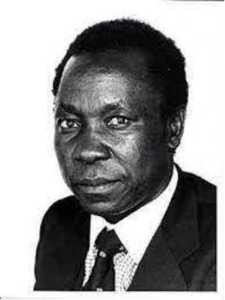
Eddison Zvobgo, like millions of his people, was a victim of European colonization in the province of Southern Rhodesia, today known as Zimbabwe. He decided to fight against the oppression through the formation of the National Democratic Party, a political group with the aim of removing the minority white rulers from power. Here, he worked under Joshua Nkomo and began his work to liberate his home. In 1961, he was sent by Nkomo to New York City to appeal to the UN on the NDP and ZANU’s behalf. When he returned, however, he was greeted by handcuffs as he was placed under arrest by government officials.
Zvobgo was sentenced to one year of imprisonment for his acts against the state, a ruling which he appealed in the Gwelo Magistrate’s Court. Unsurprisingly, he lost his case, and his sentence was upheld, being accused of attacking colonialism in Rhodesia and the current government. Though his sentence was set for twelve months, he would not be released for seven years, as unrest in Southern Rhodesia was soon to turn to violence.
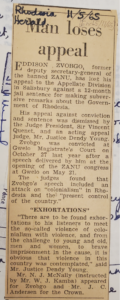
Enough was enough for the people of Zimbabwe and the War of Liberation had begun. Small-scale attacks commenced against the Rhodesian government by both the Soviet-backed ZAPU party and the Chinese-backed ZANU party. This was a long and bloody war that would last for fifteen grueling years. Because of the outbreak of the war, the sentence of Zvobgo and the other arrested opposition leaders would be increased to an indefinite status. According to the Rhodesian government, this was under the justification that Zvobgo was “likely to commit acts of violence throughout Rhodesia”.
Zvobgo was first sentenced to time in Salisbury Prison. He spent a good amount of time there before the war broke out and his sentence was extended. Once this happened, he and many other resistance leaders were moved to Rhodesian restriction camps. Zvobgo himself was transported to Sikombela restriction camp alongside future president Robert Mugabe and other founding and leading ZANU officials. Sikombela was one of the largest Rhodesian restriction camps and was surrounded by miles and miles of dense jungle. For this reason, it was lightly guarded as no prisoner wanted to risk the trek through the dangerous jungles packed full of aggressive animals. There were no cells or no bars to hold prisoners, just cheaply made tin huts combined with scorching heat. The prisoners were given only the bare essentials for survival in the form of food and water. It was a horrible existence for Zvobgo, the rest of ZANU’s leadership, and every other mistreated person who was convicted to one of the many Rhodesian restriction camps in Zimbabwe. Today, the Sikombela restriction camp is preserved as a historical monument as a reminder for the people of Zimbabwe of what those before them paid for their freedom.
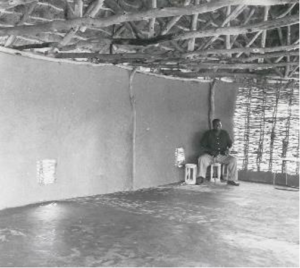
Despite the hardships that Zvobgo endured while in prison, he was not idle. He used his time in prison to get an education in law from the University of London, though this would not have been possible without George Houser. While in New York prior to his arrest, Zvobgo became linked with George Houser, a man who has aided many of Africa’s great leaders in their journeys to free their homes from their colonial oppressors. George Houser funded Zvobgo’s endeavor and thanks to him, Zvobgo was able to further his education and even pass the Rhodesian Bar Exam while imprisoned.
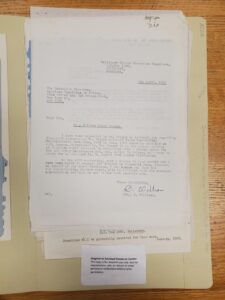
Zvobgo was released in 1971 and was immediately sentenced to exile. He traveled to Canada and then to the US to study Law at Harvard University. All the while, he was continuing his efforts to appeal to the UN on Zimbabwe’s behalf alongside figureheads such as Joshua Nkomo. Both Zvobgo and Nkomo insisted that war would continue for as long as the minority white rulers remained in control of Zimbabwe. All the while war was in fact devastating the region, and the patriot fighters showed no signs of quitting. Additionally, international sanctions began taking place as Rhodesia was condemned by many international powers.
Zvobgo at the UN: https://youtu.be/uaSPOh2uqQ0
In 1979, it was finally time for the war to end. The Rhodesian government met with representatives from ZANU and ZAPU at the Lancaster House in London. There, spokesmen for Zimbabwe’s liberation movements, including Eddison Zvobgo, successfully negotiated with the British and Rhodesian governments for Zimbabwe’s liberation. Zvobgo and the other leaders of these independence-based political parties became heroes to the people of Zimbabwe. Zvobgo then went on the have a successful political career, building the very foundation of a new nation serving as Zimbabwe’s minister of local housing before being promoted to minister of justice. For twenty-one years, Zvobgo worked to help set Zimbabwe on the right path until he retired in the year 2000. Unfortunately, his well-deserved retirement would not last, as in 2004 he lost his battle with cancer. He was buried in Harare at Hero’s Acre, and his legacy will be well remembered by the grateful people of Zimbabwe.
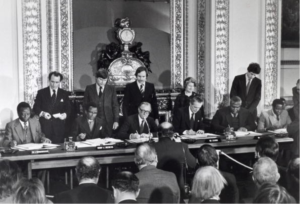
Bibliography
Carry, Robert and Mitchel, Dianna. ”EDDISON JONAS MUDADIRWA ZVOBGO | African Nationalist Leaders – Rhodesia To Zimbabwe”. Colonialrelic.Com, 2022, http://www.colonialrelic.com/biographies/edson-zvobgo/ . Accessed 30 Mar 2022.
Andrew Meldrum “Obituary: Eddison Zvobgo”. The Guardian, 2004, https://www.theguardian.com/news/2004/aug/24/guardianobituaries.zimbabwe. Accessed 7 Mar 2022
Zvobgo, Eddison. “Letter to the UN from the National Democratic Party of Southern Rhodesia” 1961
“Political detainees and the liberation struggle: Part Three …a look at Sikombela and Wha Wha detention centres” 2015 https://www.thepatriot.co.zw/old_posts/political-detainees-and-the-liberation-struggle-part-three-a-look-at-sikombela-and-wha-wha-detention-centres/
Picture Citations
https://rangamberi.tumblr.com/post/98956111419/a-time-to-rise-edison-zvobgo
https://en.wikipedia.org/wiki/Eddison_Zvobgo
https://blogs.fcdo.gov.uk/stories/lancaster-house-inside-the-house-that-made-history/